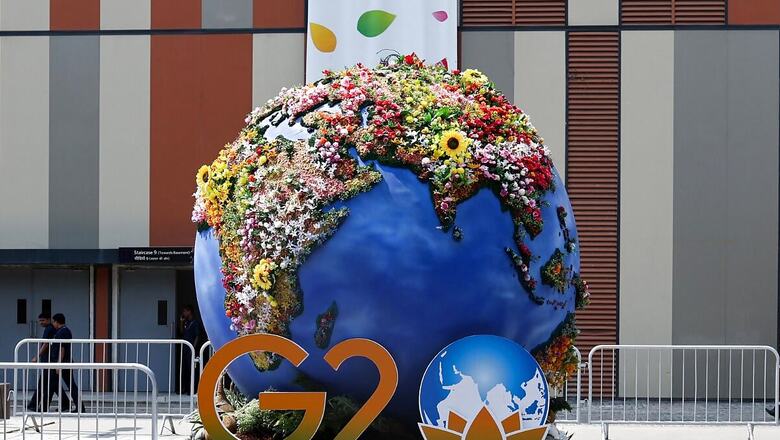
views
The G20 has adopted a consensus declaration on issues facing the bloc, Prime Minister Narendra Modi announced on Saturday, the first day of the two-day summit, in New Delhi. “On the back of the hard work of all the teams, we have received consensus on the G20 Leaders Summit Declaration. I announce the adoption of this declaration,” Modi told the G20 leaders in the national capital.
On climate change, the leaders’ declaration called on the G20 member states “to set an ambitious, transparent and trackable New Collective Quantified Goal (NCQG) of climate finance in 2024, from a floor of $100 billion a year, taking into account the needs and priorities of developing countries in fulfilling the objective of the UNFCCC and implementation of the Paris Agreement.”
“Recalling para 18 of the Glasgow Climate Pact, we urge the developed countries to fulfil their commitment to at least double their collective provision of adaptation finance from 2019 levels by 2025, in the context of achieving scaled up financial resources,” it said.
Here’s a look at the top takeaways on climate change from the G20 Leaders’ Summit Declaration:
- Need to accelerate efforts to phasedown unabated coal power, in line with national circumstances
- Will work towards facilitating low-cost financing for developing countries to support their transition to low carbon/emissions
- Will pursue and encourage efforts to triple renewable energy capacity globally through existing targets and policies, in line with national circumstances by 2030
- Reiterate our commitment to take action to scale up sustainable finance
- Recognise need for increased global investments to meet our climate goals of the Paris agreement
- Note need of $5.8-5.9 trillion in pre-2030 period required for developing countries, in particular for their needs to implement their emission targets
India has made a strong push for clean energy at the G20 Summit, announcing the launch of a global biofuel alliance to boost the use of cleaner fuels. The alliance, with the United States and Brazil as its founding members, would help accelerate global efforts to meet net zero emissions targets by facilitating trade in biofuels derived from sources, including plant and animal waste.
“We are launching the Global Biofuel Alliance. India invites all of you to join this initiative,” Prime Minister Modi said in his remarks to leaders from the Group of 20 major economies at the summit.
The push for a biofuels alliance mirrors the International Solar Alliance launched by New Delhi and Paris in 2015 to bring clean and affordable solar energy within the reach of all.
The International Energy Agency estimates in a July report that global sustainable biofuels production would need to triple by 2030 to put the world’s energy system on track towards net zero emissions by 2050.
India, the world’s third-biggest oil importer and consumer, imports about 85% of its crude needs and is gradually building capacity to increase its output of biofuels.
India is targeting to become carbon neutral by 2070 and is expanding use of biofuel in its transport sector. It has advanced the deadline by 5 years to 2025 for doubling nationwide ethanol blending in gasoline to 20%.




















Comments
0 comment